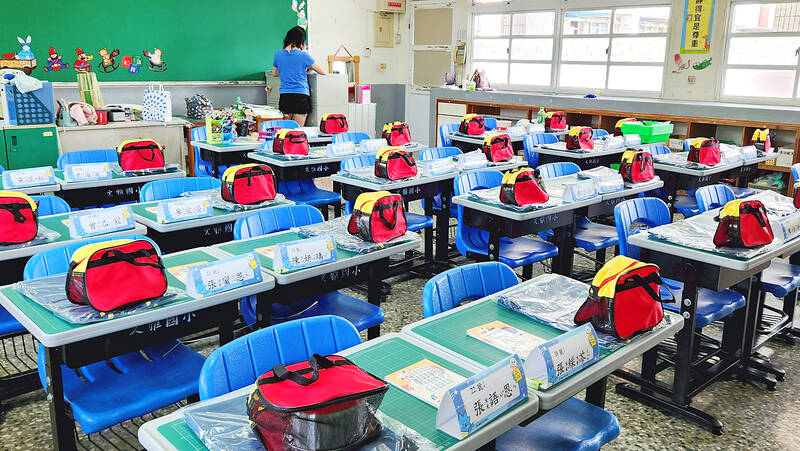The Ministry of Education is to incorporate artificial intelligence (AI) into elementary and middle-school education and expects Taiwan to become a leader in AI education in Asia within two years, Deputy Minister of Education Yeh Ping-cheng (葉丙成) said yesterday.
Minister of Education Cheng Ying-yao (鄭英耀) and his team are dedicated to promoting AI education and have made a breakthrough by establishing the Taiwan AI College Alliance to improve AI education at universities, Yeh said.
High schools would also be offering AI courses, while elementary and junior-high schools would introduce a generative AI learning partner and hold AI competitions, Yeh said.

Photo courtesy of the Taichung City Government
The ministry said it commissioned National Taiwan Normal University’s Department of Technology Application and Human Resource Development associate professor Tsai Yun-cheng (蔡芸琤) and National Taiwan University’s Department of Computer Science and Information Engineering assistant professor Chang Jie-fan (張傑帆) to plan diverse elective AI courses for high-school students.
Yeh thanked Tsai and Chang for developing an online system to review students’ program codes and enhance distance learning, saying that they helped provide equal learning opportunities for high-school and vocational-school students nationwide.
Twenty-three high and vocational schools are participating in the program to offer elective AI courses this semester, including two from remote areas, he said.
The ministry also collaborated with National Cheng Kung University’s Department of Computer Science and Information Engineering professor Su Wen-yu (蘇文鈺) to organize an AI competition for junior-high and elementary-school students starting this year, he said.
The competition encourages students to apply AI models to real world challenges and is expected to expand as an online international competition, Yeh said, adding that an AI learning partner was introduced on the ministry’s Web site this month to narrow the learning gap between urban and rural areas.
The ministry last month also released its Digital Teaching Guidelines 3.0, to facilitate the participation of principals and parents in students’ digital learning process, he said.

The Chinese military has built landing bridge ships designed to expand its amphibious options for a potential assault on Taiwan, but their combat effectiveness is limited due to their high vulnerability, a defense expert said in an analysis published on Monday. Shen Ming-shih (沈明室), a research fellow at the Institute for National Defense and Security Research, said that the deployment of such vessels as part of the Chinese People’s Liberation Army (PLA) Navy’s East Sea Fleet signals a strong focus on Taiwan. However, the ships are highly vulnerable to precision strikes, which means they could be destroyed before they achieve their intended

About 4.2 million tourist arrivals were recorded in the first half of this year, a 10 percent increase from the same period last year, the Tourism Administration said yesterday. The growth continues to be consistent, with the fourth quarter of this year expected to be the peak in Taiwan, the agency said, adding that it plans to promote Taiwan overseas via partnerships and major events. From January to June, 9.14 million international departures were recorded from Taiwan, an 11 percent increase from the same period last year, with 3.3 million headed for Japan, 1.52 million for China and 832,962 to South Korea,

SOVEREIGNTY: The rigs show that Beijing ‘rejects Taiwan’s jurisdiction’ by building in areas where Taipei demands permission to build or alter installations Chinese oil rigs have been sighted just 26 nautical miles (42km), from Taiwan’s exclusive economic zone (EEZ) near Pratas Island (Dongsha Island, 東沙島), posing a threat to Taiwan’s sovereignty if left unchallenged, a brief published by the Jamestown Foundation on Tuesday said. Pratas Island, 444km from Kaohsiung, is northeast of the South China Sea and houses a Taiwanese garrison. The brief, titled “Rigging the Game: PRC Oil Structures Encroach on Taiwan’s Pratas Island” — referring to the People’s Republic of China — analyzed photographs and said that Beijing’s tools to pressure Taiwan now include oil rigs. “Oil rigs now constitute part of Beijing’s

The Taiwan Experience Education Program (TEEP) has funded short-term internships in Taiwan for more than 4,500 young people from more than 40 countries since 2015, with the goal of attracting and retaining international talent, the Ministry of Education said yesterday. Fifty-five colleges launched 514 projects this year, including in fields such as semiconductors, artificial intelligence, medicine and biotechnology, green energy, and sustainability, it said. The program provides research and practical internships in Taiwan for two to six months, and offers cultural exchange and networking opportunities, the ministry said. For example, National Formosa University’s Embedded System and Autopilot Laboratory developed two solar-powered drones in